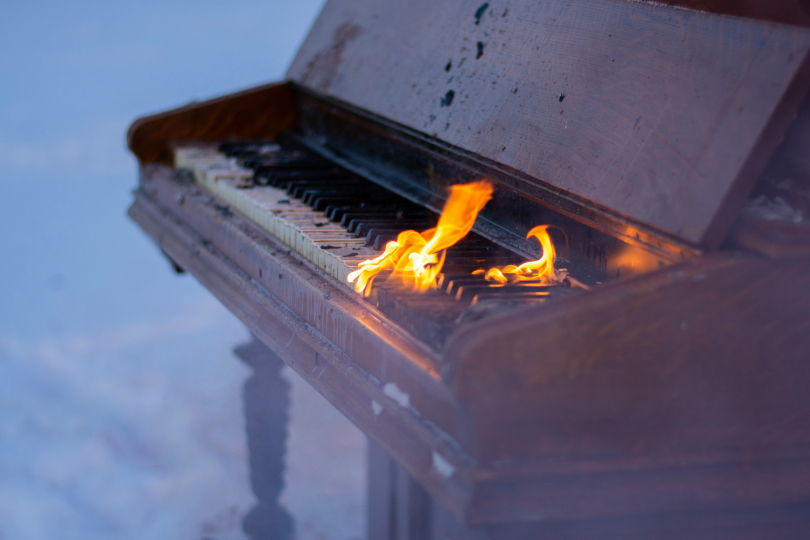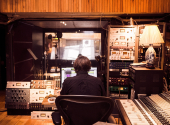
5 Tips Against Musician Burnout
You love music. You've been actively playing your whole life, so a world where “only silence remains,” Hamlet-style, is unimaginable to you – and yet, a time may come when you can’t even look at your collection of instruments. The mere thought of playing might make you physically nauseous, followed by a wave of intense guilt: How is it possible that you, a musician in both body and soul, suddenly feel a deep aversion to playing? You’re probably experiencing a creative block – or full-on musician burnout. Long-term investment of your energy, time and other resources into musical activities can take its toll. Let’s go through five tips (as always, not an exhaustive list but a collection of ideas from real experience that can be expanded or debated) to help you stay sane and find your way back to music.
1. Stop forcing yourself to play
The old motto “When I can’t go on, I push harder” doesn’t really help here. Forcing yourself to get up and play might work for a minor slump, but not for long-term creative block or burnout. When you keep pushing yourself to play (or do anything else), music can shift from being a joyful, voluntary activity to a burdensome obligation or a skeleton in the closet. Think about it – when was the last time you happily and willingly did something someone kept nagging you to do? Usually, that just makes you want to rebel and do the opposite.
If you’ve unknowingly installed that nagging little cop-angel in your head (closely related to your inner critic, see Tip #4), it’s likely that healthy discipline has turned into bullying. What you need is a break. Sometimes the block is connected to a specific instrument that holds negative associations – too much pressure, performance anxiety or even painful memories despite the good ones.
Allow yourself to consciously do nothing for a while – without guilt or a sense of failure. Maybe a few days, maybe a few weeks. You can keep your instrument nearby, just look at it, maybe touch it, but don’t feel obligated to play “real music”. Ideally, take a break from the flood of “information” on social media, too. You need distance, peace and mental space, until creative boredom kicks in – and with it, the urge to play. There’s a reason Italians value siesta and dolce far niente, the sweet art of doing nothing.
2. Try perceiving music as a non-musician
As a musician, you’re used to perceiving music like LEGO bricks. With or without formal theory, it’s still a rhythmic-melodic puzzle of chords, riffs, motifs, lyrics, sound textures... You analyse music automatically. And that professional habit might be hurting you right now more than helping.
You need to experience music from the other side – as a raw emotional experience, not a technical puzzle. You don’t have to cut music out of your life completely. Just try switching off the analytical part of your brain during listening. How? For example, close your curtains and dance wildly to your favourite song. The more ridiculous, the better. Let yourself act silly, awkward and uninhibited – even without any substances involved. Feel the music like a fan, not a performer. No pressure, no judgment.
3. Try other forms of creative expression
The fact that you don’t want to play, even if you love music and you want to create it, doesn’t mean your creativity is gone. You might even be creatively overloaded, but music just isn’t the right outlet at this moment. Try approaching it from a different angle: write lyrics without music, draw the cover art for a non-existent album or try a totally different kind of creative art – painting, photography, writing short stories. Even manual labour can help shift your brain and body into a different gear, giving your music-making self a break.
I mentioned “short” on purpose: it’s helpful to set small, manageable goals, so this new activity doesn’t turn into the same kind of obligation music did. Still, doing something non-musical can “unclog your creative drain” and help you find your way back to musical expression.
4. Find a safe space
One of the things that fuels burnout is the feeling that you always have to “perform” – to play at a certain level, because you studied music (whether it was at a community music school, a conservatory, or even higher), you’ve got experience, you’re in a band, you own a bunch of instruments... This is when the inner critic shows up. And while it can be useful in moderation, if it grows too loud, it can overwhelm you with perfectionism and harsh self-judgment. That kind of pressure is massive. Try to find a space where you’re not a professional musician, but just a person holding an instrument for the sheer joy of it. It could be playing alone at home, jamming with friends who won’t judge you, or trying out a new instrument you’ve never played before (careful here – gear acquisition syndrome alert!).
If your life circumstances allow, it can also be incredibly helpful to get away from home for a while, ideally to a different country, where you gain perspective and can rewrite your (not just musical) identity from scratch, like a blank page. But even if a big trip isn’t possible, that’s okay. Find a space, physically or mentally, where no one is evaluating you (not even yourself), and where the pressure of professional expectations doesn't follow you around.
5. If the resistance persists, look deeper
If nothing above helps (or if you have your own recovery tips – feel free to share them with us in the Facebook comments under the article), and you still feel physical aversion or emotional paralysis even at the thought of playing music, it might be more than just exhaustion, overwhelm or performance anxiety. Music, like any sincere creative activity, is emotionally demanding. It channels your innermost feelings and experiences. And when that emotional well is blocked, things can get heavy. There’s no shame in asking for help, whether it’s from a music coach, a therapist, or simply someone who understands the mental landscape of creative people.
Sharing with other musicians can help, too. You might be surprised to find out you’re not alone in your personal little hell. Therapeutic work, or even just a heartfelt conversation with someone you trust, can help you name the root of the issue. Maybe it’s exhaustion, fear of failure, painful memories, or even a deeper personal crisis that’s robbed your creative work of meaning. When you stop exhausting yourself by sweeping the problem under the rug and fighting with yourself, and instead bring the emotional “trash” up from the basement to examine it, the path back to music doesn’t have to be so thorny.
If you have found an error or typo in the article, please let us know by e-mail info@insounder.org.





